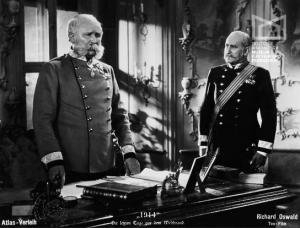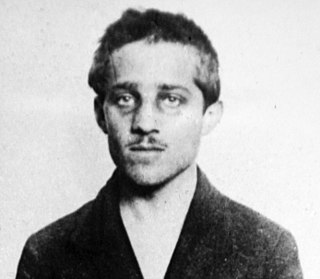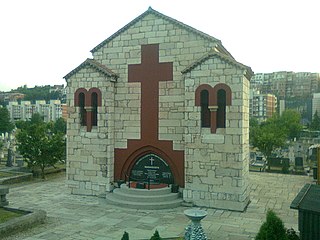 W
WArchduke Franz Ferdinand Carl Ludwig Joseph Maria of Austria was the heir presumptive to the throne of Austria-Hungary. His assassination in Sarajevo is considered the most immediate cause of World War I.
 W
WThe assassination of Archduke Franz Ferdinand of Austria, heir presumptive to the Austro-Hungarian throne, and his wife, Sophie, Duchess of Hohenberg, occurred on 28 June 1914 in Sarajevo when they were mortally wounded by Gavrilo Princip. Princip was one of a group of six assassins also containing Muhamed Mehmedbašić, Vaso Čubrilović, Nedeljko Čabrinović, Cvjetko Popović and Trifko Grabež coordinated by Danilo Ilić, a Bosnian Serb and a member of the Black Hand secret society. The political objective of the assassination was to break off Austria-Hungary's South Slav provinces so they could be combined into a Yugoslavia. The conspirators' motives were consistent with the movement that later became known as Young Bosnia. The assassination led directly to World War I when Austria-Hungary subsequently issued an ultimatum to the Kingdom of Serbia, which was partially rejected. Austria-Hungary then declared war on Serbia, triggering actions leading to war between most European states.
 W
W37 Days is a British drama miniseries that was first broadcast on BBC Two from 6 to 8 March 2014. The three-part miniseries covers the 37 days before World War I, from the assassination of Archduke Franz Ferdinand of Austria on 28 June 1914 to the United Kingdom declaring war on Germany on 4 August 1914.
 W
W1914 is a 1931 German drama film directed by Richard Oswald and starring Albert Bassermann, Hermann Wlach and Wolfgang von Schwindt. The film focuses on the leadership of the Great Powers of Europe in the days leading up to the outbreak of the First World War, culminating in the assassination of Archduke Franz Ferdinand of Austria by Gavrilo Princip. It was shot at the Babelsberg Studios in Berlin and premiered in the city at the Tauentzien-Palast on 20 January 1931. At the request of the German Foreign Office an introduction by Eugen Fischer-Baling was filmed and presented at the start of the film. A special screening was held at the Reichstag on 3 March 1931.
 W
WThe anti-Serb riots in Sarajevo consisted of large-scale anti-Serb violence in Sarajevo on 28 and 29 June 1914 following the assassination of Archduke Franz Ferdinand. Encouraged by the Austro-Hungarian government, the violent demonstrations assumed the characteristics of a pogrom, leading to ethnic divisions unprecedented in the city's history. Two Serbs were killed on the first day of the demonstrations, and many were attacked, while numerous houses, shops and institutions owned by Serbs were razed or pillaged.
 W
WArtstetten Castle is a château near the Wachau valley in Lower Austria, in the community of Artstetten-Pöbring.
 W
WUnification or Death, popularly known as the Black Hand, was a secret military society formed in 1901 by officers in the Army of the Kingdom of Serbia. It gained a reputation for its alleged involvement in the assassination of Archduke Franz Ferdinand in Sarajevo in 1914 and for the earlier assassination of the Serbian royal couple in 1903, under the aegis of Captain Dragutin Dimitrijević.
 W
WNedeljko Čabrinović was a Bosnian Serb member of the pro-Yugoslav Young Bosnia movement and one of seven young men of a secret society known as the Black Hand who conspired to assassinate Archduke Franz Ferdinand during his June 1914 visit to Sarajevo.
 W
WVeljko Čubrilović was a Bosnian Serb who was involved in the assassination of Archduke Franz Ferdinand of Austria.
 W
WThe Day That Shook the World is a 1975 Czechoslovak-Yugoslav-German co-production film directed by Veljko Bulajić, starring Christopher Plummer and Florinda Bolkan. The film is about the assassination of Archduke Franz Ferdinand and his wife Sophie in Sarajevo in 1914 and the immediate aftermath that led to the outbreak of World War I.
 W
WDragutin Dimitrijević, better known by his nickname Apis, was a Serbian army officer, chief of the military intelligence section of the general staff in 1913. He is best known as the most prominent member of the Black Hand, a secret military society that organised the 1903 overthrow of the Serbian government and the assassination of King Alexander I of Serbia and Queen Draga. Some scholars believe that he also initiated the plot to kill the Archduke Franz Ferdinand in June 1914, which led to the July Crisis and the outbreak of World War I.
 W
WGarpastum is a 2005 Russian historical drama film written and directed by Aleksei German Jr. It was entered into the main competition at the 62nd edition of the Venice Film Festival.
 W
WTrifun "Trifko" Grabež was a Bosnian Serb member of the Black Hand organization which was involved in the assassination of Archduke Franz Ferdinand.
 W
WDanilo Ilić was a Bosnian Serb who was among the chief organisers of the Assassination of Archduke Franz Ferdinand.
 W
WMihajlo "Miško" Jovanović was a Bosnian Serb who was involved in the assassination of Archduke Franz Ferdinand of Austria.
 W
WThe July Crisis were a series of interrelated diplomatic and military escalations among the major powers of Europe in the summer of 1914, which led to the outbreak of World War I (1914–1918). The crisis began on June 28, 1914, when Gavrilo Princip, a Bosnian Serb, assassinated Archduke Franz Ferdinand, heir presumptive to the Austro-Hungarian throne. A complex web of alliances, coupled with miscalculations when many leaders regarded war as in their best interests or felt that a general war would not occur, resulted in a general outbreak of hostilities among most major European nations in early August 1914.
 W
WLatin Bridge is an Ottoman bridge over the river Miljacka in Sarajevo, Bosnia and Herzegovina.
 W
WThe Man Who Defended Gavrilo Princip is a 2014 Serbian film directed by Srđan Koljević. It was one of six films shortlisted by Serbia to be their submission for the Academy Award for Best Foreign Language Film at the 88th Academy Awards, but it lost out to Enclave.
 W
WMuhamed Mehmedbašić was a Bosnian revolutionary and conspirator in the assassination of Archduke Franz Ferdinand.
 W
WCvjetko Popović was a Bosnian Serb who was involved in the 1914 assassination of Archduke Franz Ferdinand of Austria.
 W
WGavrilo Princip was a Bosnian Serb member of Young Bosnia who sought an end to Austro-Hungarian rule in Bosnia and Herzegovina. At the age of 19, he assassinated Archduke Franz Ferdinand of Austria and the Archduke's wife, Sophie, Duchess of Hohenberg, in Sarajevo on 28 June 1914. Princip and his accomplices were arrested and implicated as a nationalist secret society, which initiated the July Crisis and led to the outbreak of World War I.
 W
WSarajevo is a 1940 French historical film directed by Max Ophüls and starring Edwige Feuillère, John Lodge and Aimé Clariond. Beginning in the aftermath of the Mayerling Incident, the film portrays the love affair and marriage between Archduke Franz Ferdinand of Austria and Sophie, Duchess of Hohenberg, leading up to their eventual assassination in 1914 in events that triggered the First World War. The film was not a commercial or critical success. Following the German occupation of France the film was banned, and Ophüls fled into exile for the second time.
 W
WSarajevo is a 2014 German-Austrian biographical television film that depicts the assassination of Archduke Franz Ferdinand of Austria.
 W
WSophie, Duchess of Hohenberg was the wife of Archduke Franz Ferdinand of Austria, the heir to the Austro-Hungarian throne. Their assassination in Sarajevo sparked a series of events that eventually led to World War I.
 W
WSt. George Slays the Dragon is a Serbian war drama film directed by Srđan Dragojević and written by Dušan Kovačević. The movie premiered on March 11, 2009.
 W
WVojislav Tankosić was a Serbian military officer, vojvoda of the Serbian Chetnik Organization, major of the Serbian Army, and member of the Black Hand, who participated in the May Coup and was accused of involvement in the Assassination of Archduke Franz Ferdinand.
 W
WThe Vidovdan Heroes Chapel is a Serbian Orthodox chapel and mausoleum located on the Holy Archangels Georgije and Gavrilo Orthodox Cemetery located in Sarajevo, Bosnia and Herzegovina.
 W
WDr. Rudolf Zistler or Cistler (1886–1960) was an Austro-Hungarian socialist and lawyer, most known for having defended members of Young Bosnia on trial for the assassination of Archduke Franz Ferdinand of Austria.